MercoPress. South Atlantic News Agency
Tag: Mercedes Marco del Pont
-
Thursday, October 2nd 2014 - 07:15 UTC
Climbing volatility of the US dollar in Argentina forces resignation of central bank president
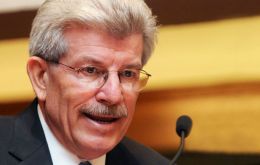
Argentine Central Bank President Juan Carlos Fabrega resigned Wednesday after an alleged disagreement with President Cristina Fernandez over how to keep a lid on the black market exchange rate ('blue' dollar) that hit a record 16 pesos per dollar last week.
-
Monday, April 29th 2013 - 23:17 UTC
Argentine government considering options to contain the ‘parallel’ dollar
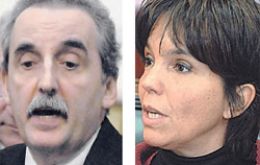
The Argentine government is considering different options to contain the current skyrocketing of the US dollar, but according to the financial media there are different positions in the cabinet of President Cristina Fernandez. One of those calls for direct interventions while the other adopts a more passive attitude saying the issue is speculative and ‘marginal’.
-
Monday, April 1st 2013 - 10:15 UTC
Argentine central bank says it has enough reserves to contain the run on the US dollar

With insistent rumours of imminent measures to try and control the value of the US dollar in Argentina, Central Bank Governor Mercedes Marcó del Pont, stressed that the country has more than 40 billion dollars in reserves “to manage the foreign exchange market avoiding sharp changes”.
-
Wednesday, December 26th 2012 - 06:27 UTC
Argentine economy forecast to expand 4.6% in 2013, but dollar clamp remains
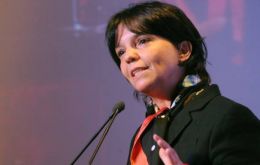
Argentina's economy is seen growing 4.6% next year, improving after drought and a slowdown in top trading partner Brazil took a toll in 2012, the central bank president said in an interview published on Sunday. She also advanced that the so called ‘dollar clamp’ or strict restrictions on the purchase of foreign currency remain.
-
Monday, November 5th 2012 - 13:02 UTC
Argentina calls on G20 for global action against ‘predatory’ actions from ‘vulture funds’

Argentine Economy Minister Hernán Lorenzino called for developed countries to set limits to ‘vulture funds’ and credit rating agencies as “promoters of the global crisis,” as he addressed the G20 Finance Ministers meeting in Mexico on Sunday.
-
Sunday, November 4th 2012 - 06:24 UTC
Argentina to blast ‘vulture funds’ at the G20 ministerial meeting in Mexico
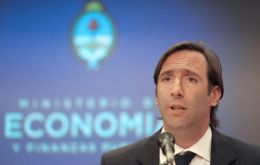
Argentine Economy Minister Hernán Lorenzino and Central Bank Governor Mercedes Marcó del Pont are leading the country’s delegation in the technical G20 meeting in Mexico, where they are expected to insist on the government’s criticisms against ‘vulture funds’ and credit rating agencies.
-
Saturday, August 18th 2012 - 02:37 UTC
In nine years of “Kirchner era” Argentina honoured 32 billion dollars in debts
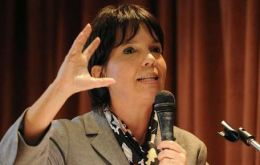
Argentina’s Central bank confirmed that during the “Kirchner era” the country paid 32 billion dollars in pending debts, “the centre piece of the policy to recover sovereignty by cutting indebtedness” and praised the decision to appeal to the bank’s international reserves to support such a policy.
-
Saturday, July 28th 2012 - 11:21 UTC
Argentine grains futures market in shock: government wants operations in Pesos
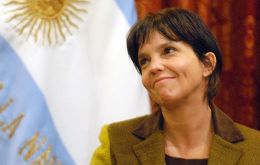
Argentina could require that grains futures be listed in the local Peso currency the head of the central bank said on Friday, a move that traders said would paralyze markets in the leading global food supplier.
-
Saturday, July 7th 2012 - 00:35 UTC
Argentine central bank announces “pesification” of real estate operations

Following the official new curbs on US dollar purchasing for savers, the head of the Argentine Central Bank Mercedes Marcó del Pont came on stage to defend the measure and anticipate that operations in the real estate market will have to be done in Argentine Pesos.
-
Sunday, April 1st 2012 - 08:28 UTC
Rootyling for cash, the central bank has become Argentina’s Piggy bank

The Economist argues that with the latest legislation, the Argentine central bank has lost its legal independence and become the piggy bank of President Cristina Fernandez government.
